Rolling Stone’s Jeff Goodell reports that President Obama is preparing to reject the Keystone XL oil pipeline, even though the State Department has twice concluded that its construction would have negligible effects on carbon dioxide emissions. How might he pull that off? Goodell points to one option: rewriting history.
“Five years ago, it would have gone through without comment,” the piece quotes former Obama adviser Heather Zichal saying. But, Goodell writes,
A few things happened that prevented that: Republicans tried to bully it through, which grabbed the attention of activists in Nebraska and elsewhere, who made the pipeline a litmus test of the president’s commitment to ending our dependence on fossil fuels.
This version of history is half true, at best. Yes, environmental groups have taken an issue of scant importance to the climate and irrationally pushed it to the center of the country’s global warming debate. But the anti-Keystone movement was well-established by late 2010; environmental groups pitched me and The Post around then. Sure, some Republicans in Congress did things like send letters to the State Department supporting the project — and some Democrats did the same questioning it — but they did not really try to “bully it through” until well into 2011, finally approving a Keystone XL amendment to an important payroll tax bill by late in that year. Yes, Republican meddling made the situation worse. But, at that point, the activist movement against the pipeline had extremely vocal for a very long time, both in Nebraska and nationally, and even if it had not been, the Republicans’ move would not have validated the unrelated reasoning behind the anti-KXL movement.
The Keystone XL pipeline is a terrible litmus test for determining people’s seriousness about global warming, yet some environmentalists have made it a matter of clan loyalty. It is easy — easier, I would say — to consider the pipeline issue a routine infrastructure question that became a bizarre distraction while favoring strong, unrelated national policies that would really cut into US carbon dioxide emissions. Environmentalists tout the symbolic power of the anti-pipeline movement to rouse a certain set of activists. But they discount the fact that they are alienating others who want the same essential result — a meaningful reduction in greenhouse emissions. I am not interested in, let alone fired up about, using public policy to entertain the excesses of some in or sympathetic to the environmental movement. Neither should President Obama. And he certainly cannot do so and then blame Republicans.
Stephen Stromberg is a Post editorial writer, specialising in domestic policy, including energy, the environment, legal affairs and public health. This post originally appeared in The Washington Post.










